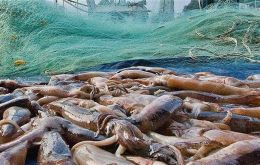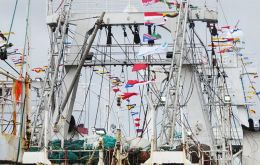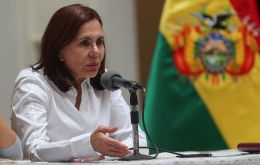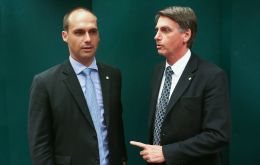MercoPress. South Atlantic News Agency
Stories for November 28th 2019
-
Thursday, November 28th 2019 - 09:58 UTC
Falklands: Argentina and UK agree to extend Humanitarian Plan to identify remains in multiple grave

The outgoing government of Argentine president Mauricio Macri and the United Kingdom are in talks for an extension of the humanitarian plan which, with Falkland Islands consent and under the guidance of the International Committee of the Red Cross had enabled the identification of 115 remains buried in the Islands with the sole reference, “Argentine soldier, only known to God”, the tragic legacy of the 1982 conflict.
-
Thursday, November 28th 2019 - 09:55 UTC
Congress urges Piñera to use the “constitutional tools” to quell the violence. Chilean Peso plummets to new low

Chilean lawmakers agreed late on Wednesday to fast-track reforms to beef up security, warning that a resurgence in violence and vandalism was threatening to derail the country’s 30-year-old democracy.
-
Thursday, November 28th 2019 - 09:54 UTC
Bolsonaro minister “military scare” phrase backfires and forces an apology

Two of Brazil’s former presidents, a chief justice and heads of both chambers of Congress repudiated the country’s economy minister for saying the government might take draconian steps if leftist opponents stirred up protests such as those in Chile.
-
Thursday, November 28th 2019 - 09:54 UTC
Colombian president caught between demands from businesses and people protesting in streets

Widespread street protests in Colombia are likely to force embattled President Ivan Duque to make major changes to his tax reform proposal if he wants to pass the bill before a year-end deadline.
-
Thursday, November 28th 2019 - 09:49 UTC
Santiago graffiti underline protests' spirit “Never again will they have the comfort of our silence”

A month of intense protests against inequality and police repression in Santiago have transformed the Chilean capital’s streetscape into a caterwaul of graffiti whose messages reflect the deep discontent in this once genteel Latin American city.
-
Thursday, November 28th 2019 - 09:46 UTC
Falklands government and fishing companies contrast over ITQ fees

The announcement by the Falkland Islands Executive Council referred to ITQ fees, particularly toothfish and calamari, which would represent an annual £3.9 million additional income for government coffers, was contrasted by a release from the Falklands' seafood sector pointing out that “to increase quota access fees paid by local fishing companies by 50% will increase costs to the industry by £4 million per annum”
-
Thursday, November 28th 2019 - 09:46 UTC
The contrasting position, “Government strip an additional £4 million per annum from the Falklands' Seafood Sector”

The decision of the recent meeting of Executive Council attended by MLA Elsby, Bragger and Edwards, to increase quota access fees paid by local fishing companies by 50% will increase costs to the industry by £4 Million per annum. The hike is targeted at the Loligo and toothfish quota holders.
-
Thursday, November 28th 2019 - 09:46 UTC
Bolivian interim government implements sharp shift in foreign policy in just two weeks

Foreign policy of the interim Bolivian government foreign policy has shifted sharply in just two weeks under conservative President Jeanine Anez, a senator who took over in a power vacuum left by the resignation and exile of long-term leftist leader Evo Morales.
-
Thursday, November 28th 2019 - 09:19 UTC
Brazil: foreign investors remain cautious, fearful of divisive politics and weak growth

This year has already been the biggest in a decade for share offerings from Brazilian companies, but there has been little sign of the foreign investor appetite that fueled prior rallies, as weak growth and divisive politics keep many on the sidelines.
-
Thursday, November 28th 2019 - 08:45 UTC
Brazil nominates career diplomat to be ambassador in US; Bolsonaro's son wish over

Brazil’s government on Tuesday sent to the Senate the nomination of career-diplomat Nestor Forster to be ambassador to the United States, ending a saga in which President Jair Bolsonaro tried to nominate his own son for the role.
